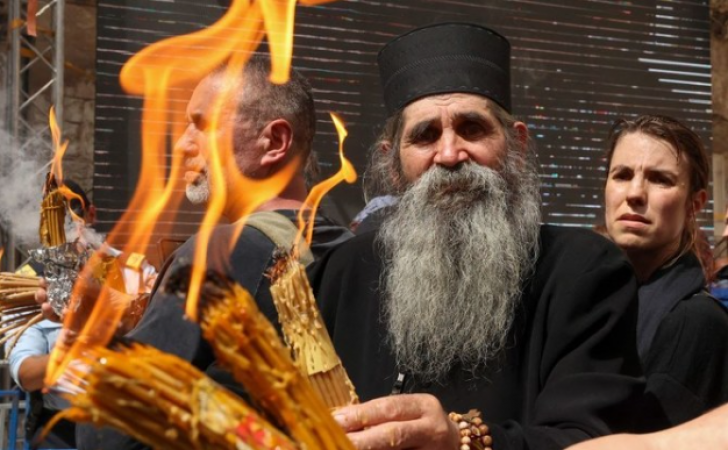
Ramallah: Orthodox Easter ceremonies will take place on Saturday, and Israeli police will restrict the number of worshippers entering the Church of the Holy Sepulchre in Jerusalem. Church leaders expressed their displeasure and said they would not cooperate.
Church leaders were incensed by the decision to restrict access to the Holy Fire, the Eastern Orthodox Church's most significant Easter celebration, on Saturday. They view it as a continuation of what they believe to be Israel's ongoing efforts to limit the rights and freedoms of the local Christian community.
They claimed that the police were using "heavy-handed" tactics, and they declared that they would not cooperate.
Also Read: Donald Trump travels to New York to appear in court
The Greek Orthodox Patriarchate, the Custody of the Holy Land, and the Armenian Patriarchate announced in a joint statement that they would "continue to uphold" their traditions and conduct the ceremony as they have for two millennia. They also stated that everyone who wished to worship was welcome to participate.
Only 1,800 worshippers will be allowed inside the Church of the Holy Sepulchre this year, with an additional 1,200 outside, as opposed to previous years when as many as 10,000 people crammed into the building. Access to the vicinity of the church will also be regulated by additional checkpoints around the Old City.
As Ramadan, Passover, and Easter all fell during a period of heightened Israeli-Palestinian tensions, this year's religious festivals in the Old City have been particularly sensitive.
Palestinian Christians in the Gaza Strip have been outraged by Israel's cancellation of 739 permits that had been granted to them.
Among its 2 million residents, the Gaza Strip is home to about 1,000 Christians. At the Saint Porphyrios Orthodox Church in Jerusalem, the majority of them observe Greek Orthodoxy and observe Easter one week after the Western celebration.
Israeli authorities require a permit from Gaza residents in order to leave the enclave, which has been under an Israeli and Egyptian blockade since 2007.
The Orthodox Church, the Gaza Baptist Church for Evangelical and Protestant Christians, and the Roman Catholic Holy Family Church are the three churches found in Gaza. Orthodox Christianity predominates among Christians in the Gaza Strip.
Also Read: Easter closures at frontline cemeteries due to hazardous war debris
Orthodox Christian Samer Tarzi of Gaza told Arab News that the community had received official notification from the Israeli government that their permits had been denied.
Christians who had previously travelled from Gaza to Jerusalem to observe the holiday were contacted by Israeli authorities, who requested that they return home by April 13.
"Every Easter raises a challenge that the Israelis use as an excuse to revoke permissions and protect Jerusalem. We are compelled to spend Holy Week, which is the cornerstone of the Christian faith, and Easter in Gaza this year, said Tarzi, who is typically denied a permit to Jerusalem for unknown reasons while the rest of his family is.
This week is holy for Christians because anyone who prays, fasts, travels the Path of Sorrow, and attends Easter is regarded as having made a pilgrimage to the Christian faith, Tarzi continued.
"Canceling Easter and the pilgrimage of Orthodox Christians this year because the main holiday of the Resurrection is in Jerusalem," George Anton of the Catholic Church in Gaza told Arab News. "Revoking permits for Orthodox Christians and depriving them of a visit to the Church of the Holy Sepulchre during Easter means cancelling Easter and the main holiday of the Resurrection is in Jerusalem."
"In this case, all religious celebrations and pilgrimages related to the holiday will come to an end, and Orthodox Christians will have to celebrate Easter in the local church in Gaza," he continued.
Gaza Only during Christmas and Easter are Christians permitted to travel to Jerusalem and Bethlehem, and during COVID-19 restrictions, they were prevented from doing so for almost two years.
Arab News was informed by church leaders in Jerusalem and Bethlehem that Palestinian Christians ran the risk of being negatively impacted by a rise in right-wing violence stoked by Israel's new government.
The Al-Mezan Center for Human Rights, based in Gaza, has condemned the Israeli action and urged the international community to fulfil its responsibility to guarantee regional adherence to the principles of international law.
Palestinians "take the trouble to apply for a permit and suffer anxiety and tension while awaiting the response of the Israeli authorities," it was stated, "even though the restriction violates the international humanitarian law that protects the right of people living under occupation to move freely within the occupied territory."
According to the Gaza-based Human Rights Center, Christians in the Gaza Strip "are repeatedly denied access to the holy places in the cities of Jerusalem and Bethlehem, in a...perpetuation of violations of Palestinians, Muslims, and Christians' rights to practise their religious rites."
"We firmly support the demands of the churches in Jerusalem to allow free access freely and without hindrance for Christian pilgrims to attend the Holy Saturday ceremonies," the Palestinian presidency declared.
Also Read: China's 'threatening' drills near Taiwan are condemned by Germany
Additionally, it urged all pilgrims to visit the Church of the Holy Sepulchre, take part in Holy Saturday festivities, and worship in freedom and peace while pleading with the international community, particularly the US administration, to act quickly to put an end to Israeli crimes that restrict the freedom of worship for both Christian and Muslim believers.
Meanwhile, on Wednesday, the right-wing Israeli Minister of National Security Itamar Ben-Gvir protested Prime Minister Benjamin Netanyahu's decision to stop settlers from entering Al-Aqsa Mosque during the last 10 days of Ramadan in order to prevent any potential escalation by travelling to the Old City of Jerusalem.
Ben-Gvir harshly criticised Netanyahu's choice, calling it a "grave mistake that will lead to further escalation."